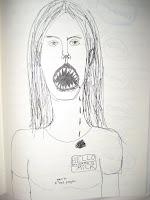
This is a picture of me at a Halloween party with my daughter and her friend. This was shortly before I began to get the feeling that not everyone appreciated my elaborate face paint. First, it was the funny looks from the other moms, all of whom, without exception, were dressed as witches. Not scary witches. Generic witches with pointy black hats and black or purple dresses. Their looks askance didn't bother me too much. I thought,
Maybe they're jealous because their costumes aren't as interesting. It was when three and a half year old Romeo saw me from across the room and collapsed in tears on the floor that I thought,
Hm. Maybe I've overdone it a bit. When little Charley Mae, not yet two years old, began to visibly shake from the safety of her mother's lap, and yell, summoning her limited vocabulary, "GO 'WAY! GO 'WAY!" I had to face facts. I had seriously misjudged the situation. I had gone too far. These mothers were looking at me, not with envy, but with justified concern.
I was scaring the children.
Those of you who know me will attest to the fact that I strive, perhaps a little too hard, to be a very good mother. I rarely pay homage to the shadow side of this good mother experience. Robert Johnson writes, "The persona is what we would like to be and how we wish to be seen by the world... The shadow is that part of us we fail to see or know" (p. 4). He goes on, "But the refused and unacceptable characteristics do not go away; they only collect in the dark corners of our personality. When they have been hidden long enough, they take on a life of their own--the shadow life.... If it accumulates more energy than our ego, it erupts as an overpowering rage or some indiscretion that slips past us..." (p. 4-5).
Yes, and you find yourself, the loving, breast feeding, co-sleeping, super attached mom, dressed as a terrifying ghoul at a kid's party, scaring other people's children. What was I thinking? you wonder as you retreat to the bathroom to frantically remove your make-up with baby wipes, wondering if you should make a short speech attempting to explain yourself. "I'm an artist, you see, and I just haven't really had a chance to paint in a while, or to express myself creatively, in any way. I used to sing in clubs, I mean, I really had quite a life, and I was playing with the face paint before we left the house, you know, and I guess I got a little out of control... Did I mention I'm studying to be a psychotherapist?"
Better, perhaps, not to say anything.
The shadow side of motherhood is dreadfully tabu. I remember flying into a rage when my daughter wouldn't go to sleep one night. I felt so awful, I wanted to die. I called my friend Caren who reassured me. "You're such a good mom. It's just really hard." It is really hard when you haven't slept for more than three hours in a row for months, and you haven't been able to be physically separate from your nursing baby, and you just want an hour alone before you start nursing again. You just want the use of both arms for a brief time. Maybe longer. And your baby is screaming her head off, in a way that is biologically designed to completely freak your system out, and the only thing that makes it stop is sacrificing everything you want for yourself in that moment and picking her up.
After I talked to Caren, I googled "motherhood and rage" and found almost nothing. Thank God for Anne Lamott, who had a piece about screaming at her teenaged son. The dearth of acknowledgment of the dark side of mothering, what I like to call The Other Mother, was staggering and depressing and a clear communication: This is not acceptable. We don't talk about this. We don't write about it.
Well, I do. I'm writing about it now. And hopefully it will provide solace for those who find themselves on the shadow side of their conscious desire to be what the culture expects of mothers--impossibly patient, endlessly loving, and above all, self-sacrificing. I would love to hear from other mothers anywhere and everywhere about how we can honor the shadow side of this experience in ways that protect our children and preserve our sanity. What rituals might we perform in honor of The Other Mother?







 out how there are no humans on this card, only animals. I feel as nonverbal as the dog and the wolf. If I were less self-conscious, or perhaps more rural, I would howl at the moon tonight. That would feel appropriate. The Moon has been omnipresent for me for several months now, and is certainly the ruling planet of this website, as it symbolizes the unconscious. Pollack writes of the image on the card,
out how there are no humans on this card, only animals. I feel as nonverbal as the dog and the wolf. If I were less self-conscious, or perhaps more rural, I would howl at the moon tonight. That would feel appropriate. The Moon has been omnipresent for me for several months now, and is certainly the ruling planet of this website, as it symbolizes the unconscious. Pollack writes of the image on the card, 











